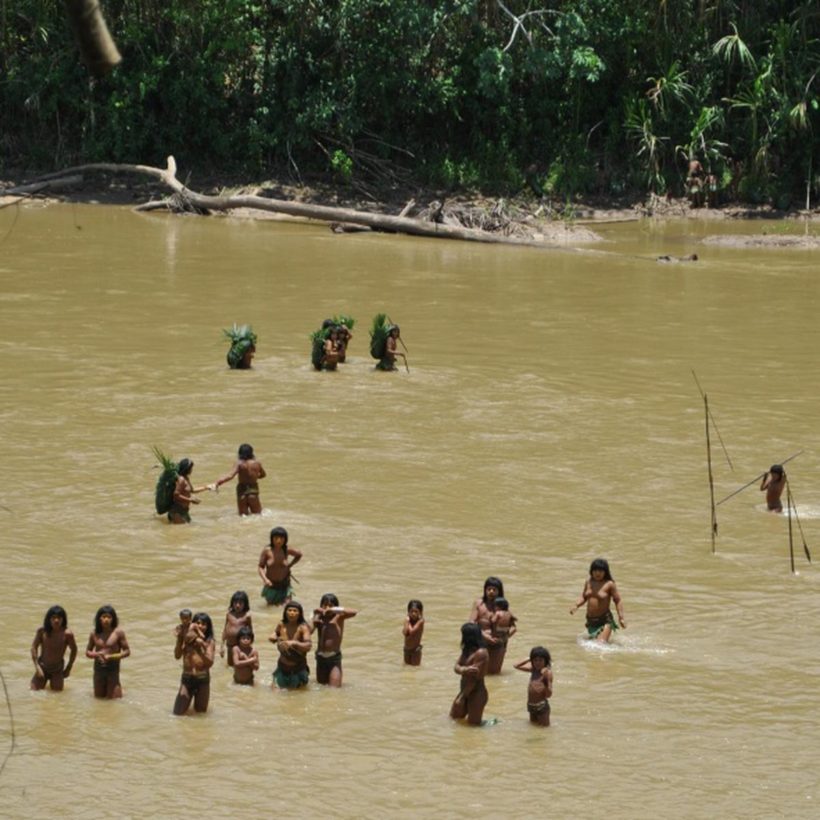Backed by Aidesep, indigenous organisations Orpio, Orau and Corpiaa expressed their rejection of attempts to remove protection from peoples in isolation and to exploit their intangible territories.
Indigenous organisations in the country categorically rejected the initiative of the Regional Government of Loreto (GOREL) and business groups to remove the protection of peoples in isolation and initial contact (PIACI).
Through statements, the indigenous organisations questioned the recent manifesto in which private sectors and Governor Elisbán Ochoa demanded the repeal of the PIACI Law (N°28736).
As the Regional Organisation of Indigenous Peoples of the East (ORPIO) pointed out, the request “obeys the particular interests of economic groups that seek to continue plundering the forests and natural resources without respecting the territorial rights of indigenous peoples”.
Backed by the Interethnic Association for the Development of the Peruvian Rainforest (Aidesep), the Regional Organisation Aidesep Ucayali (ORAU) and the Regional Coordinating Body of Indigenous Peoples of Aidesep Atalaya (COORPIA) also spoke out.
Imminent danger
ORPIO recalls that if the PIACI Law is repealed, the territories of the peoples in isolation will be invaded, a situation that will lead to the extermination of the members of these human groups in a condition of extreme immunological vulnerability.
The law contains the main fundamental rights of PIACI and “its repeal would mean a crime against humanity against these populations who enjoy the same human and constitutional rights as everyone else”, says ORPIO.
“We wish to express our indignation at the expressions charged with racism and discrimination contained in the aforementioned ‘Manifesto of the Loreto Region’ when it states that there are ‘true indigenous peoples’ whom the Regional Government and these groups claim to represent”.
As ORPIO stresses, these groups use the names of the indigenous peoples for the purpose of political exploitation in favour of their particular and predatory interests.
The organisation also questions the desire to deny the existence of peoples in isolation, despite the fact that their presence and existence in the forests of the Peruvian Amazon has been recognised for more than three decades.
As the indigenous organisation recalls, the PIACI have been recognised by the Peruvian state and its entities, as well as by international organisations, including the United Nations (UN) and the Inter-American Commission on Human Rights (IACHR).
ORPIO therefore calls on international organisations to demand that the Peruvian State comply with the mechanisms for the protection of the rights of the PIACI, such as Law N°28736.
Furthermore, it demands that the Executive reject the communiqué and comply with its constitutional and legal obligations to protect peoples in isolation and initial contact.
It also calls on Congress not to be complicit in the campaign by operators of groups such as the ‘Coordinadora de Desarrollo Sostenible de Loreto’ (Loreto Sustainable Development Coordinator).
“We reject the economic pretensions and interests alien to the desires and aspirations of the indigenous peoples that undermine the legitimate hopes for a future and well-being of the indigenous communities and their representative organisations,” the document concludes.
Proven existence
The indigenous organisation ORAU also expressed its rejection of these requests from representatives of public institutions and private groups.
In a communiqué, they underline that studies and evidence carried out by the indigenous organisations themselves prove the existence of the peoples in isolation who move in Madre de Dios, Cusco, Ucayali, Huánuco and Loreto.
The Ucayali organisation also emphasised the threats to these peoples from illegal activities such as illegal mining, drug trafficking, land trafficking and illegal logging.
Protection against personal interests
Similarly, on Tuesday 26 April, the Regional Coordination of Indigenous Peoples of Aidesep Atalaya (COORPIA), together with its four bases, published a statement in response.
In addition to stressing that the peoples in isolation and initial contact depend on the forest for their subsistence, they recalled that these groups of people live in a situation of high social, cultural, epidemiological and territorial vulnerability.
The organisation questioned the fact that it is the regional governor of Loreto, Elisbán Ochoa Sosa, who is failing in his duties as a public servant and undermining the mechanisms for the protection of the PIACI.
Worse still, this regional authority is a member of the Special Trans-sectoral Regime (RET), the mechanism in charge of establishing protection policies for these peoples.
“We demand that the Peruvian Government ‘warn’ the Regional Government of Loreto that the country’s National Policy is aimed at the protection of the PIACI and not at personal interests”.
The statement also reminds that complaints and recall processes could be carried out against these local and regional authorities, due to their proposal and insistence on violating the rights and the national and international normative framework for the protection of PIACI.
Finally, COORPIA stresses the urgency of strengthening the monitoring and control actions carried out by indigenous organisations and the Ministry of Culture, in order to counteract these permanent threats against Indigenous reserves.
Interests at stake
As we remember, on the 25th of April, the so-called “Manifesto of the Loreto Region” was made public, where regional authorities and private groups ask that the actions for the Indigenous Reserves in process be paralysed.
Without further substantiation, they allege the non-existence of peoples in isolation, point out that the intangibility of the PIACI territories would “dispossess” other settlers, and then express their interest in oil extraction, forestry and agroforestry.
With ultra-conservative links, the signatories oppose treaties for the protection of indigenous defenders – such as the Escazú Agreement – and direct their pronouncements to Congress and the Executive.
In addition to Governor Elisbán Ochoa, they include Wilfredo Panduro Rojas (Colegio de Ingenieros del Perú-Loreto), Daniel Jiménez Huanan (Mayor of Yaquerana), Christian Pinasco Montenegro (spokesperson for the so-called ‘Coordinadora por el Desarrollo de Loreto – CDL’), among others.
Photo source: Actualidadambiental.pe






